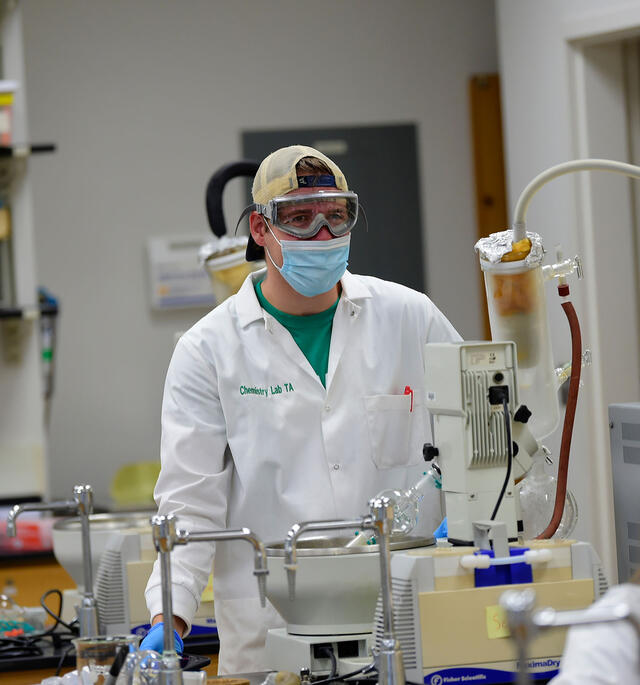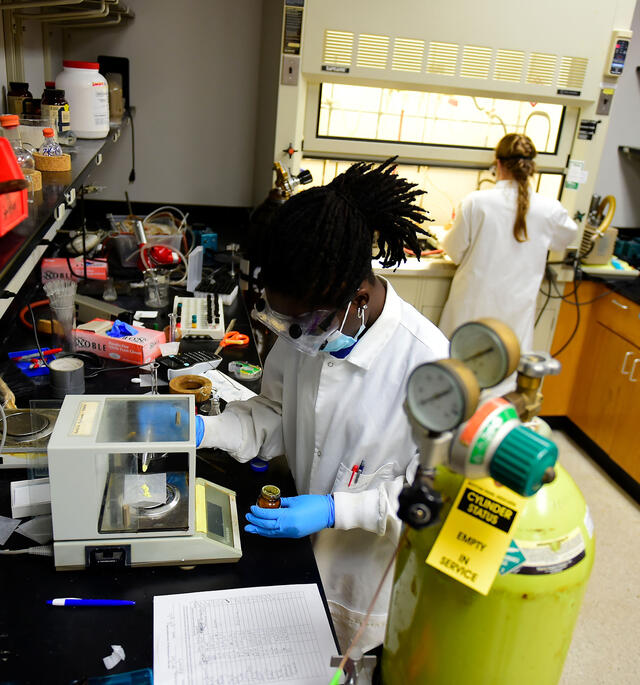McDaniel students join in worldwide research efforts to discover drugs to treat COVID-19
In the face of the deadly global coronavirus pandemic, pharmaceutical data vaults have been unlocked and shared – an unprecedented move in research that McDaniel Chemistry professor Dana Ferraris seized to give his students the opportunity this summer to discover drugs to fight COVID-19.
Chemistry professor Dana Ferraris (middle, back row) with his COVID-19 research students, (front, l.-r.) Jayce Klingenberg, Zoey Nichols and Priscilla Owusu, (back, l-r) Zach Kiick, Ferraris, Max Gosselin socially distanced on the steps of Eaton Hall.
In the face of the deadly global pandemic, pharmaceutical data vaults have been unlocked and shared – an unprecedented move in research that McDaniel Chemistry professor Dana Ferraris seized to give his students the opportunity this summer to discover drugs to fight COVID-19.
Social distancing and wearing masks to lower their risk of coronavirus infection, Ferraris and five students are using the newly available data to fuel their quest to synthesize a molecule to treat victims of COVID-19.
"My group is designing small molecules to inhibit the coronavirus’ main protease – in other words, interrupt the virus’ life cycle and render it harmless." - Chemistry professor Dana Ferraris
Research does not get any closer to the cutting edge than this.
“There has been tremendous effort among the scientists of the Earth to share any information if it helps develop drugs against COVID-19,” says Ferraris, whose cancer-drug discovery research students are frequent presenters at professional conferences. “My group is designing small molecules to inhibit the coronavirus’ main protease – in other words, interrupt the virus’ life cycle and render it harmless.
“This is a strategy that has worked wonderfully in both HIV and HCV (Hepatitis C) therapy.”
Armed with recently obtained data and a successful medicinal chemist as their mentor, the students dove into making new compounds that they thought had potential to destroy the virus…without harming its victims. The main protease is the enzyme that clips long inactive protein chains into active proteins that do specific jobs in viral reproduction. If the protease is inhibited, the virus cannot reproduce.
A month into the 8-week project, they hit a snag. It was clear their compounds had no future but they pivoted and, without missing a step, moved forward.

Biochemistry major Zach Kiick
“Within failure there is growth – that’s one thing that I will take away from this experience,” says senior Biochemistry major Zach Kiick from Gettysburg, Pa. “The first half of the summer we were building compounds that after testing, we found did not have the values we were looking for. However, out of this failure we learned what we thought we could improve upon and went on a different path.”
Although Chemistry - Kinesiology major Jayce Klingenberg plans to stay on her career path of becoming a physician assistant, she couldn’t resist the opportunity to study and possibly discover a drug against COVID-19.
“I’ve learned how to set up different reactions for the process of deprotection of molecules and adding different warheads that might target and cut short the lifecycle of the virus,” says the senior from Hampstead, Md. “We’ve seen how important it is to be able to adapt and alter our plan to try out different compounds that can potentially place us on a path to success.
“It has been amazing to be part of this team of students with Dr. Ferraris, where we are researching something as important as an antiviral for coronavirus, which has impacted many people’s lives so significantly.”
Like Klingenberg, junior Zoey Nichols hasn’t changed her mind about going to dental school, but she now sees research as a possible alternative.
“Some of my most important takeaways from this experience are that I believe I would enjoy working in a chemistry lab and that just because something didn’t work out the way you anticipated, doesn’t mean it was a failure,” says the Molecular Biology major from Princess Anne, Md.

Biochemistry major Priscilla Owusu (left) and Molecular Biology major Zoey Nichols
Research as an important component in preparation for any career in the sciences, says Senior Biochemistry major Priscilla Owusu of Bowie, Md. -- but the fact that she’s involved in research aimed at coronavirus is simply the “icing on the cake.”
“This experience has showed me the significance of thinking out of the box and the importance of teamwork in research,” says Owusu, who is navigating, for the first time, working in a medicinal chemistry lab.
Inspired by to join the research project by “the urgency to help put an end to the terrible pandemic that is taking so many lives,” Max Gosselin was no stranger to medicinal chemistry, having taken Ferraris’ medicinal chemistry course and learning about the process of creating a drug through FDA approval. Now he’s taking what he learned and applying it towards hands-on drug development.
“This experience has been fascinating – to develop new compounds, analyze them and apply data by strategically modifying my compounds to improve the results,” says the senior Chemistry major from Mt. Airy, Md. “I feel so fortunate to be among only a few undergraduate students who are participating in COVID research.”
Watch WBAL-TV Jennifer Franciotti's report on McDaniel's coronavirus research.